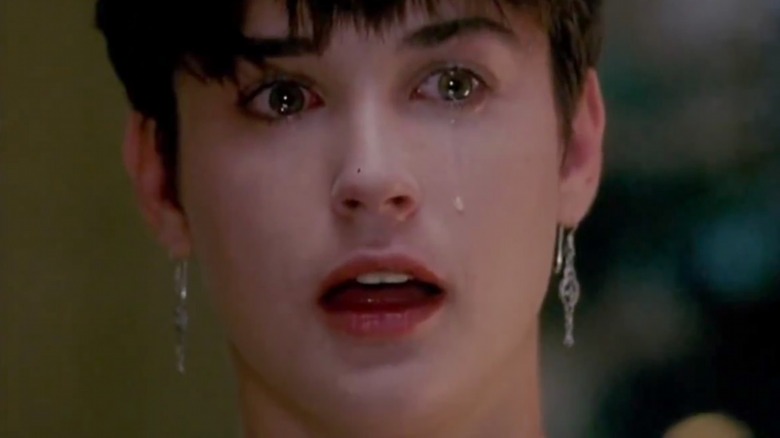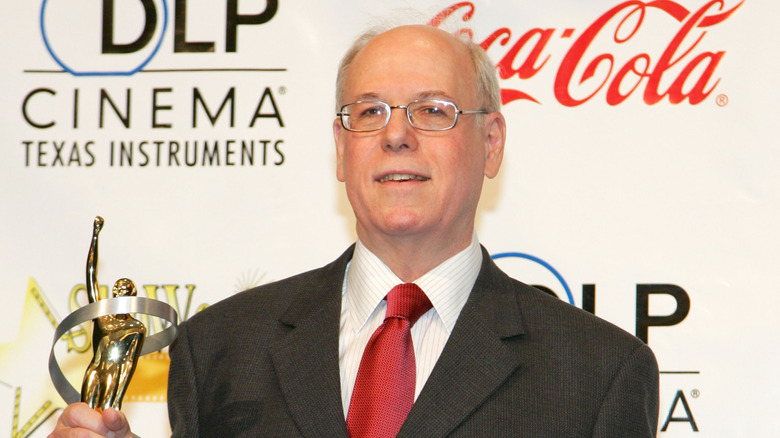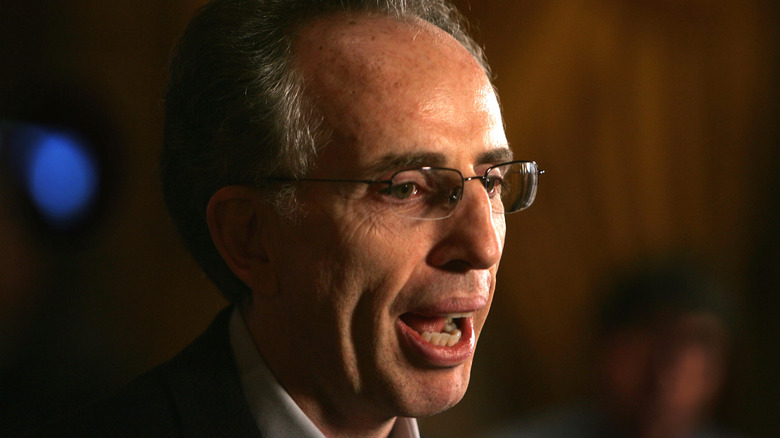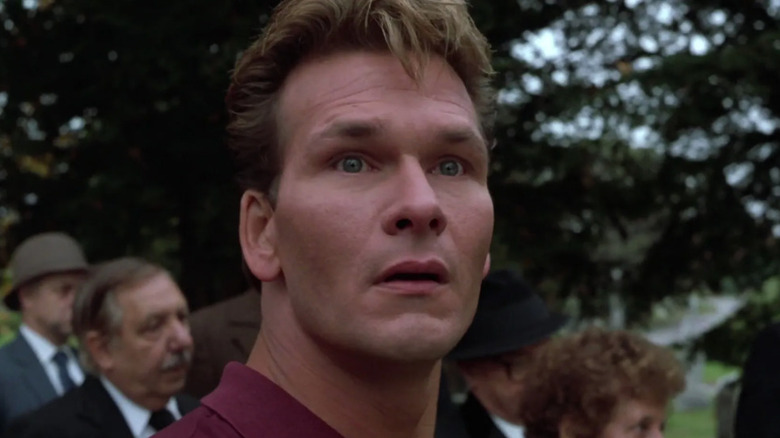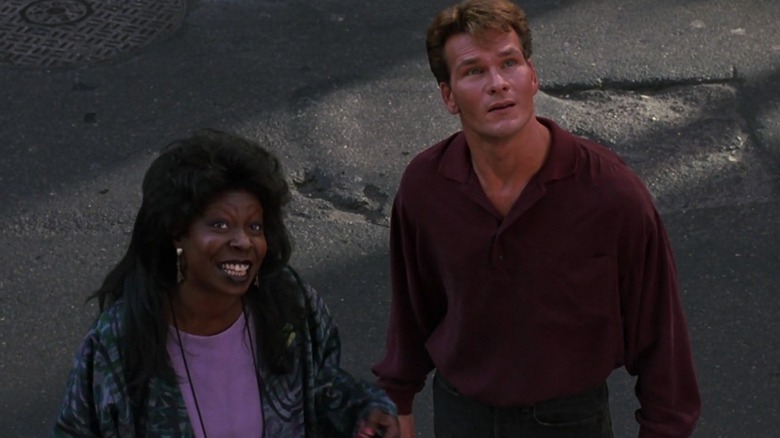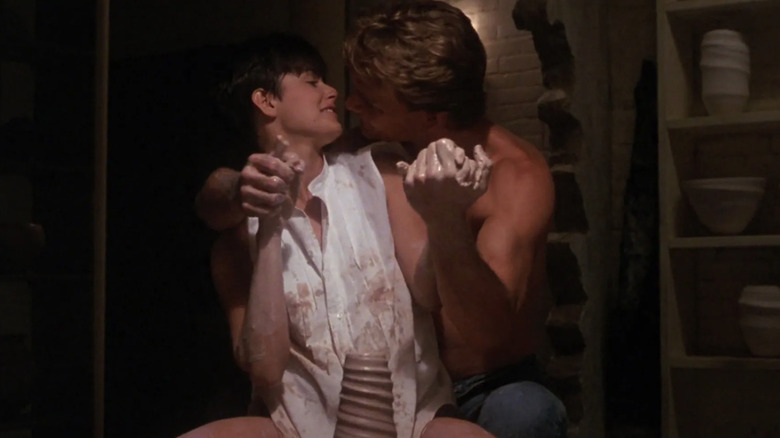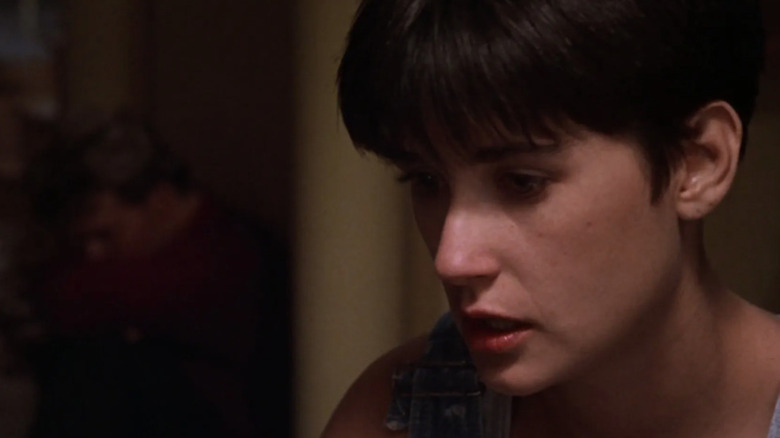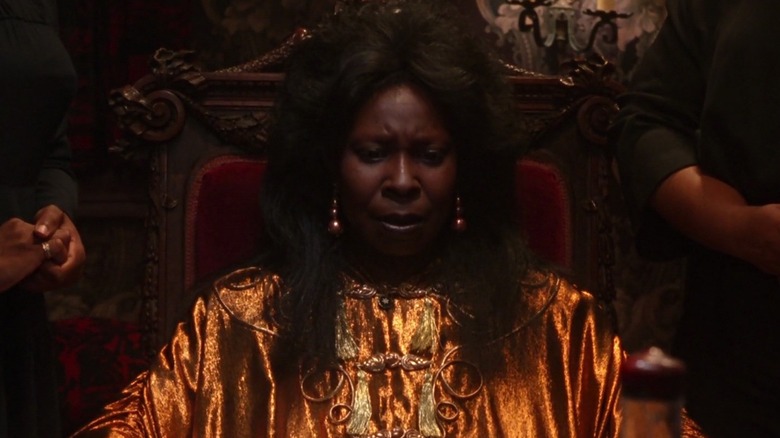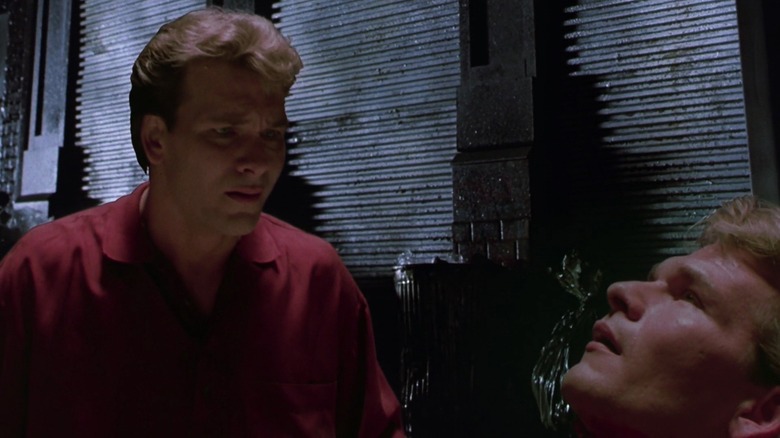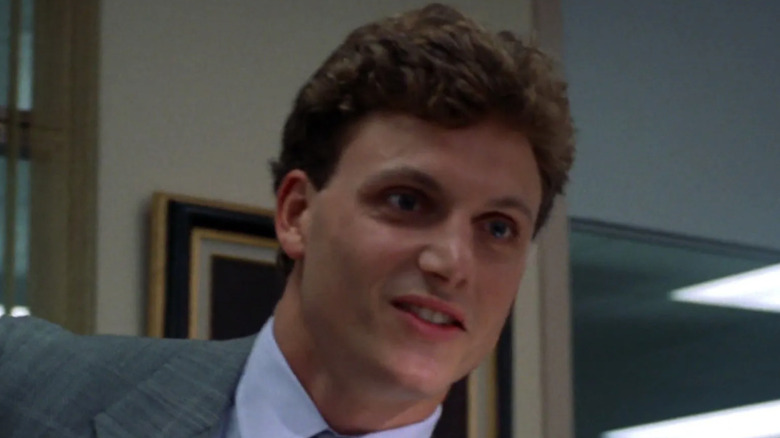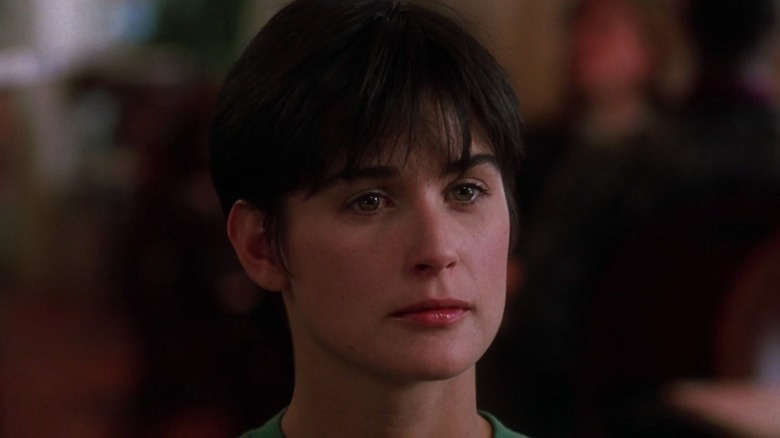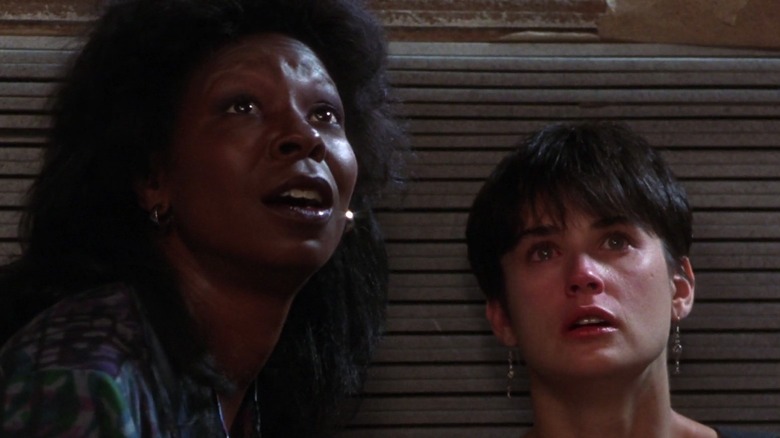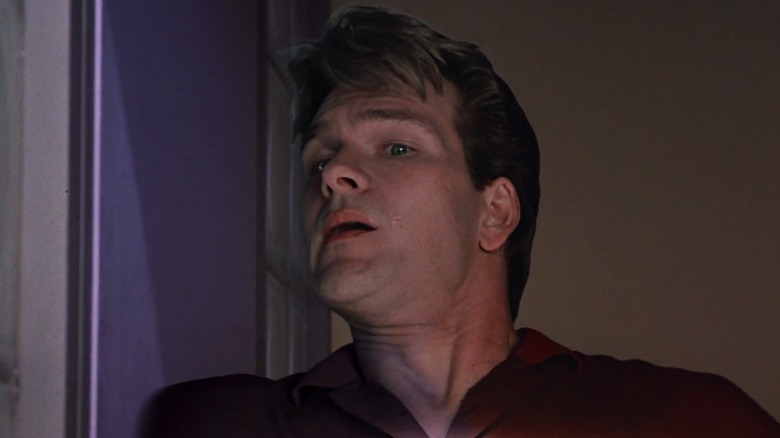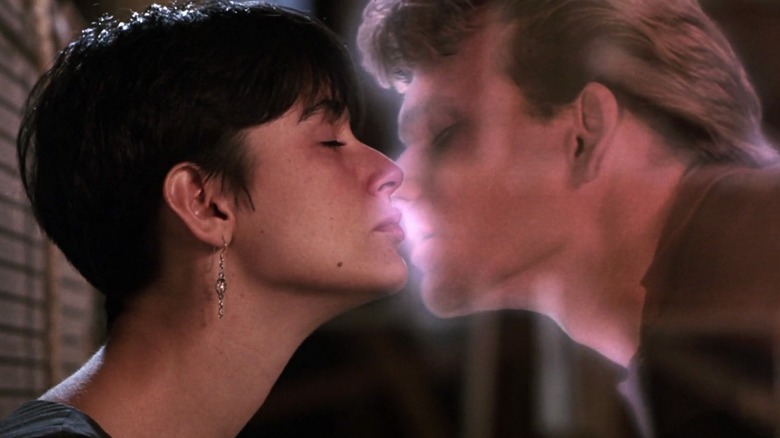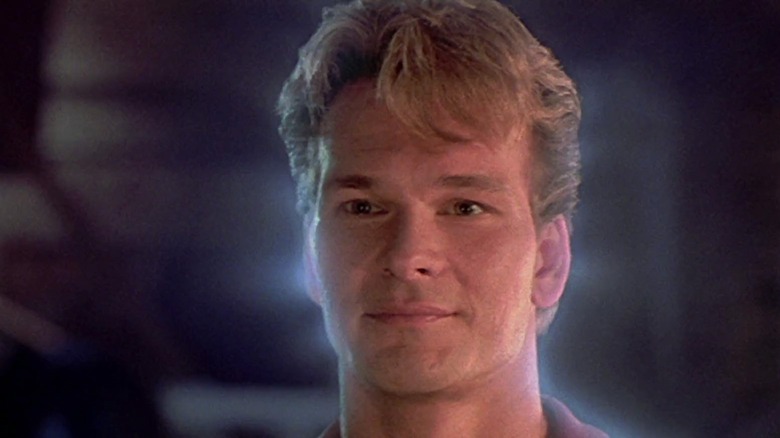The Untold Truth Of Ghost
Jerry Zucker's classic 1990 hit, "Ghost," has become an indelible part of pop culture, elevating "Unchained Melody" into a favorite love song and spawning endless spoofs of its iconic pottery scene. The film tells the story of Sam (Patrick Swayze), a banker who is killed by a mugger and finds himself as a ghost, invisible and unable to engage with the physical world. As Sam watches his girlfriend, Molly (Demi Moore), cope with his death, he starts to learn the truth of who really killed him. He tries to contact Molly with the help of a psychic, Oda Mae Brown (Whoopi Goldberg), to warn Molly of impending danger and find the closure he needs to move on to the next world.
"Ghost" became the highest-grossing film of 1990 and won two Academy Awards. But the film's success was a surprise to all those involved, as Ghost's blending of genres — romance, comedy, and the supernatural — made it a risk. Sam wasn't the typical leading man — many A-list stars weren't interested in the role because playing a dead man felt like a loss of "vitality" — and the film's exploration of love through the spirit world was a bit different from other popular romances of the time like "Pretty Woman." Still, "Ghost" has continued to resonate with audiences for over three decades now, so whether you're already a fan or meeting Sam, Molly, and Oda Mae for the first time, read on to find out how "Hamlet," a pottery magazine, and an obscure prison film all led to the making of "Ghost."
Ghost was inspired by Hamlet (and some LSD)
Screenwriter Bruce Joel Rubin first got the idea for "Ghost" while watching a production of Shakespeare's "Hamlet." When Hamlet's dead father tells him to avenge his death, Rubin thought, "Wow, let's transpose that into the 20th century; it'd be an interesting story," as he reminisced to the Detroit News. So the idea for "Ghost" was born but perhaps the origins of the story go back even farther to 1965, when Rubin accidentally took a full eye dropper of LSD instead of a few drops (it was the '60s, after all). The massive LSD trip took Rubin on a journey where he decided he wanted to tell an "entertaining and not pontifical" story from a ghost's perspective.
It would take some time for Rubin's "Ghost" script to gain traction. After all, as his LA agent told him just before dropping him, Rubin's work was "too metaphysical" and "nobody wants to do a ghost story." Luckily for Rubin, his other supernatural script for "Jacob's Ladder" was causing a stir in Hollywood and eventually, the "Ghost" script landed at Paramount. Rubin was thrilled to turn his story over to the hands of a dramatic auteur like Martin Scorsese or Steven Spielberg, but his producers (or the universe, depending on who you ask) had other plans for him.
Ghost was Jerry Zucker's departure from comedy
When Jerry Zucker first got the script for "Ghost," he forgot it on his nightstand for a while. Zucker had been part of the Zucker, Abrahams and Zucker directing team with his brother David and childhood friend Jim. The trio were well-known in the comedy world as they'd directed films like "Airplane!," "Top Secret!," and "Ruthless People." By the time he was given the script for "Ghost," Zucker was ready to direct a film on his own so long as it wasn't a satire.
Zucker's wife picked up "Ghost" from the nightstand one day and handed it to her husband, telling him that he needed to read it immediately. Zucker thought the script was terrific and signed on to direct. Rubin was initially upset (okay, he cried) with the choice since Zucker was a comedy director, but after the two met and had a philosophical discussion, he realized Zucker was the one to do the film. So Zucker took on "Ghost," the first film he'd direct on his own and funnily enough, one that wasn't a comedy.
Patrick Swayze wasn't the first choice for Sam
Although Patrick Swayze had won over the hearts of millions by refusing to put Baby in a corner in 1987's "Dirty Dancing," he wasn't at the top of Zucker's list for Sam because he was mostly known as an action star due to his role in "Roadhouse." In fact, Zucker was so unconvinced that he said Swayze would be Sam "over [his] dead body." Instead, the part went out to other A-list actors at the time, like Harrison Ford (who read the script three times and didn't "get it"), Paul Hogan, and Michael J. Fox. Bruce Willis had the chance to play opposite then-wife Demi Moore, but turned down the script because he didn't think it would work. Years later, he told Playboy he was a "knucklehead" for making that choice.
While Zucker was hesitant to consider Swayze, Rubin knew he was the man for the role after seeing Swayze interviewed by Barbara Walters, where he wept while talking about his father. Swayze, meanwhile, was determined to get the role as the script had left him "boo-hooing." When Swayze came in to read the final farewell scene of the film, there wasn't a dry eye in the room and Zucker's mind was changed: they'd found their Sam.
Patrick Swayze fought for Whoopi
Part of what sets "Ghost" apart is its comedic side and it would be hard to imagine the film without Whoopi Goldberg. Certainly, we wouldn't have been blessed with this priceless (and always useful) gif from the film. But Whoopi also wasn't the top choice for Oda Mae Brown, a fraudulent psychic who discovers she actually does have psychic gifts when she starts communicating with Sam's ghost.
The role of Oda Mae went out to nearly every Black actress and performer in Hollywood, including Oprah Winfrey, Patti Labelle, and Paramount's favorite choice, Tina Turner (although Zucker had his doubts about her as an actress). While Oda Mae is the comedic glue of the film, Zucker didn't want a comedian for the part. But Swayze fought for Whoopi to read because as he put it to People magazine's Jess Cagle, they clicked right away and were just like "girlfriends." Again, Zucker changed his mind once he saw Goldberg and Swayze's chemistry and how Goldberg "hit it out of the park." As it turns out, she was much more than just a comedian; she could act.
The pottery scene was an accident
It's nearly impossible to imagine "Ghost" without its super sexy scene of Sam and Molly at the pottery wheel while The Righteous Brothers' "Unchained Melody" plays from a jukebox. But this scene wasn't in the original script at all. As Rubin first wrote it, Molly was a sculptor, which Zucker felt didn't work because "it felt harsh, taking a hammer and chisel and banging on something," as he told Forbes in 2020. Zucker continued on to describe how one day, while doing post-production on the second "Naked Gun" movie, he was sitting next to a sound engineer, who was reading a pottery magazine. As Zucker flipped through the images of beautiful pots and pieces, he got a vision of a pottery wheel and people making things with their hands. Rubin agreed to make Molly a potter instead and wrote the scene into the film.
While Demi Moore took pottery classes to prepare for the role, the pot she threw on camera collapsed, which wasn't in the script. In fact, Swayze had decided to "throw a curve ball" and make the pot fall, which made it into the final cut of the film. The rest, as they say, is history as this scene has become one of the most well-known, beloved and parodied film scenes of all time. In fact, the chemistry was so hot that Zucker decided to cut an actual sex scene out of the film. Who needs sex when you have clay?
Demi's surprise haircut
Demi Moore had made a name for herself as part of the 1980s "brat pack" and was always the top choice for Molly. She was a long-haired beauty who could cry on cue from either eye, which made her perfect for this role of a grieving woman. But Moore had ideas of her own for Molly; specifically, she wanted to play up Molly's strength rather than weakness.
So she showed up to the first day of filming with a shocking new 'do: she'd cut all of her hair to sport Molly's now iconic pixie cut. Zucker was horrified; he'd told Swayze to grow out his hair and his leading actress had arrived with a totally different look. But when he started videotaping their rehearsals, he saw how good Moore looked and decided to go ahead with this style. In fact, he's thanked her since for the bold choice because if she had asked him at the time, he would have said no.
Whoopi's Oscar nomination and win were historic
Whoopi Goldberg is one of only 16 people to be an EGOT (Emmy, Grammy, Oscar, and Tony) winner and it's thanks to "Ghost" that she has that "O" win. Goldberg won the Oscar for Best Supporting Actress in 1991 for her role as Oda Mae Brown, which made her only the second Black actress at the time to win this award (a full 51 years after Hattie McDaniel's win for 1939's "Gone with the Wind").
Goldberg made history again as she became the first African-American woman to be nominated for both the Best Supporting Actress and Best Actress awards (for her role in 1986's "The Color Purple"). Goldberg's win for "Ghost" proved inspirational for many, including Tiffany Haddish, who was a pre-teen at the time and told Variety in 2021 that when she watched Goldberg's Oscar speech, it made her think that "if they can do it, I can do it too."
Ghost helped Swayze confront his own ghosts
Patrick Swayze's father passed away suddenly from a heart attack in 1982, which led to Swayze's long struggle with depression and alcoholism. Eight years later, Swayze's work on "Ghost" brought up some unexpected and repressed feelings about his father's death. When he saw the plaster dummy of his character's body, it reminded him of his father's funeral, when he nearly fainted from touching his father's body in the coffin.
He told People magazine that "I had pushed that memory out of my life until that moment on location when it all came back, big time," and that as a result, there were some scenes in "Ghost" where "something happened to me that was very scary." After the film was released, Swayze said that he needed to do "Ghost" for his "soul." Perhaps some of these difficult confrontations with his past and father's death were part of the reason for that feeling.
Tony Goldwyn was haunted by Ghost
Years before his turn as US President Fitz Grant in "Scandal," Tony Goldwyn was an unknown actor with a very known last name (his grandfather was OG movie mogul Samuel Goldwyn) whose feature film debut was as Carl, the villain of "Ghost." Goldwyn's wife was the production designer for "Ghost," and she encouraged him to bug his agent to get an audition for Carl. Zucker wasn't convinced because he thought Goldwyn was "too nice" (we're starting to sense a pattern here with Zucker and his casting intuition). Eventually, Zucker came around and Goldwyn hit the big screen as Carl, Sam's business partner with an ulterior motive.
Goldwyn found unexpected success with "Ghost" as people around the world saw him as the man who screwed over Sam. In fact, not long after the film's release, he went to dinner and the waitress refused to serve him. As he told it to the AV Club, she was rude to him and eventually asked if he was an actor. She realized that she knew she hated him but didn't remember why, just that she did; she actually had thought he was someone she'd slept with who had hurt her. But no, he was just the guy who hurt Patrick Swayze. Either way, it was reason enough not to take his order.
Demi thought Ghost was a 'recipe for disaster'
While Demi Moore seems to have been the only sure thing as far as casting "Ghost," she actually thought the film was anything but a sure thing. During a 2013 AFI screening of "Ghost," Moore revealed that while she found Rubin's script "fascinating and different," she also thought the film was a "recipe for disaster" since it was a love story about a dead guy trying to save his wife with comedic elements mixed into it. Critics at the time seem to have agreed as the film got mixed reviews, even as audiences continued to line up for screenings.
She went on to say that the film was going to be "something really special, really amazing, or really an absolute bust," but ultimately, it was the alchemy of the cast and crew that made the film work. And that alchemy helped make "Ghost" stand the test of time, where it's still being watched and loved over 30 years later.
Ghost was a surprise box office hit
While Zucker, Rubin, the cast, and producers were all unsure of how this supernatural love story would do in the theaters, all were pleasantly surprised to see that "Ghost" not only did well at the box office, but was an outright smash. The film was made for $22 million and grossed over $500 million worldwide, making it the top hit of 1990 and one of the most successful films ever. In fact, at the time of its release, it was only the third film to surpass $500 million (besides "Star Wars" and "E.T.") and it was a love story to boot.
There weren't many 1990s films that matched the success of "Ghost" and the ones that did were mostly action flicks like "Independence Day," "Jurassic Park," and "Terminator 2: Judgment Day." "Ghost" had a life of its own, with audiences lining up around the block and theaters in Monterrey, Mexico allegedly providing women with envelopes of tissues to make sure they could cry as much as they needed (although this latter item sounds more like an urban legend).
Beliefs in the beyond
While the success of "Ghost" could be attributed to a variety of factors, perhaps part of what helps it resonate with audiences is its exploration of spirituality, which was present both on and off screen. Writer Bruce Joel Rubin has a strong spiritual side and practice as he's taught meditation for decades. As he notes in his bio, he writes films "to witness and explore the unseen world of our lives." For the 30th anniversary of "Ghost," Jerry Zucker noted that Rubin's immersion and belief in spirituality was akin to having a general present when writing a war movie; Zucker also described "Ghost" as a movie that Rubin wrote from the heart, not from a desire to make something commercial.
The cast also had their own beliefs in other worlds. In a 1994 interview with the Academy of Achievement, Whoopi Goldberg expressed her belief that "when people die, the spirit flies from them and fragments," and that she's been "hit with a lot of fragments." Perhaps it's some of those fragments that helped her tap into the role of Oda Mae, who starts out a skeptic but becomes a believer. Patrick Swayze believed that people could come back and visit loved ones because "death is a beginning, not an ending," according to Wendy Leigh's Patrick Swayze: One Last Dance.
Unchained Melody is a bit more literal than not
It's hard to imagine the pottery scene in "Ghost" without the Righteous Brothers' "Unchained Melody" playing on the jukebox (fun fact: Zucker brought the jukebox from his own home). In fact, "Ghost" was originally going to be called "Unchained Melody," as one of the producers had decided before production that this would be the song used in the pottery love scene. But the name, "Unchained Melody," doesn't refer to a metaphorical, boundless love; the song was actually written for the little-known 1955 prison film, "Unchained," which was based on the book, "Prisoners are People."
Originally sung by Todd Duncan, the song first appears in "Unchained" when an inmate starts singing it in his cell. The lyrics "time goes by so slowly" are actually about the slowness of time for this inmate, who's stuck in jail while his lover is outside. The song was nominated for an Oscar at the time (but didn't win) and it wasn't until the Righteous Brothers covered it in 1965 that it started to gain some traction. And it really wasn't until Patrick Swayze and Demi Moore turned cold, wet clay into the hottest material on earth that the song made it into popular culture as the staple of classic love songs it is today.
Ghost became part of hip-hop slang
Of all the ways that "Ghost" has made a lasting impact on popular culture, one of the most surprising may be its influence on hip-hop. One might not expect to see a connection between the supernatural love story of "Ghost" and rap songs but Patrick Swayze has a last name that rhymes with "crazy," which has led to him being name-dropped in a number of hip-hop songs.
With the release of "Ghost," his name took on a new meaning as rappers like the Notorious B.I.G., DMX, and Method Man started saying "Swayze" as a substitute for the slang "ghost," which means "disappear." While "ghosting" has come back into the mainstream as a term for "disappearing," especially in the realm of dating, maybe it's time to take a note from these rap songs and start saying that we're "Swayze-ing" someone. It has a nice and weird ring to it, don't you think?
